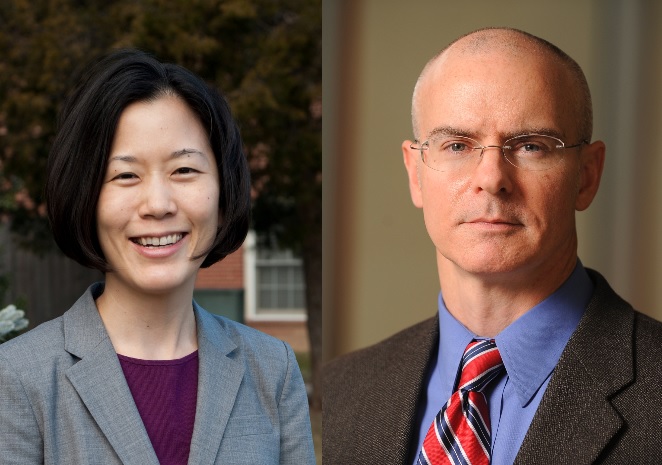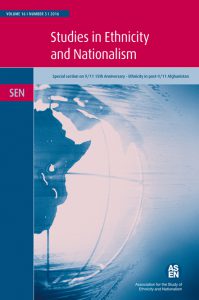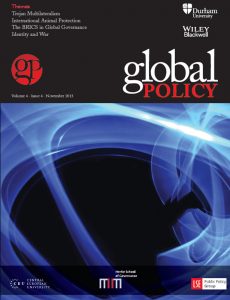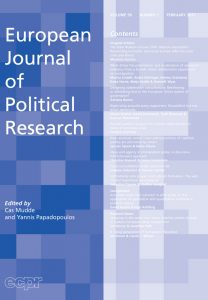Interview with Cynthia Lum and Christopher Koper, new Editors in Chief of Criminology & Public Policy
by Cynthia Lum and Christopher Koper, George Mason University. Interview by Sara Norberg and Taylor McKinnon · Published · Updated

1. Congratulations on being appointed the new editors of Criminology & Public Policy (CPP). As you begin your term, what is your broad vision for the future of the journal?
We are thrilled to be selected as the new editors of Criminology & Public Policy and intend to continue the excellent work of the outgoing editors Professors Bill Bales and Dan Nagin in making CPP one of the most influential and high-ranked journals in our field. We are deeply committed to knowledge exchange and translation with criminal justice practitioners, policymakers, and community members. We also strongly believe in the importance of the dissemination, implementation, and institutionalization of high-quality research findings into practice. Appropriately, the journal will be housed in the Center for Evidence-Based Crime Policy (CEBCP) in the Department of Criminology, Law and Society at George Mason University. The CEBCP’s efforts reflect a strong academic tradition in our discipline of carrying out rigorous research that is impactful in the field. Additionally, CPP research will benefit from the CEBCP’s extensive infrastructure for translation and dissemination of research findings into local, state, national, and international arenas.
2. In your announcement, you mentioned three goals: to elevate the journal’s academic status and rankings, maintain its focus on the most pressing issues, and heighten its impact on the dissemination and use of research in criminal justice policy and practice. What inspired you to enact these goals as the new editors of CPP?
Two groups inspire us toward these goals: the members of the American Society of Criminology (ASC) and the citizens and practitioners who experience the criminal justice system every day. We owe it to both to disseminate cutting edge research to the field so that justice can be experienced and delivered in effective, fair, and legitimate ways. So many members of the ASC are practice-oriented criminologists who believe that science should play a central role in criminal justice decision making. Their efforts, often in collaboration with community groups, citizens, and practitioners in the trenches, try to continuously understand and improve the delivery and receipt of justice in an always-changing environment. We have seen firsthand when scientific information informs policy and practice and makes a difference. Scientific journals like CPP are focused on helping them achieve their goals.
“Two groups inspire us toward these goals: the members of the American Society of Criminology and the citizens and practitioners who experience the criminal justice system every day.”
3. What efforts are you making to reach out to practitioners and policy makers? What impact do you hope these outreach efforts will have on the broader community?
The American Society of Criminology has already devoted substantial resources to disseminate its members’ work published in CPP. With the help of the Criminal Justice Research Alliance, CPP has structured protocols and press releases for selected articles to increase their visibility amongst policy-makers. We also have several new initiatives that we have put in place as the new editors. We are now active on Twitter (@CPPJournal) and will be alerting followers to new articles that come out as they come out. We are moving towards an Early View system so that publications are available as soon as they are finalized. Each year, we intend to leverage the CEBCP’s annual Congressional Briefing event to highlight researchers and papers from CPP on various high-profile topics (our next Congressional Briefing is September 17th and will highlight papers that will appear in the first issue of 2020 on mass violence in the U.S.).
4. Since you are introducing an annual best paper award for the journal, how do you think this exciting new award will support your outreach efforts?
We want researchers and practitioners to see CPP as their first stop for their work. We hope to use the ASC Annual Conference as a forum to highlight not just the annual best paper award, but the excellent work by authors who publish with CPP. This monetary award will hopefully provide incentives for younger scholars to submit to CPP and build their resumes with important honors that celebrate their policy efforts.
5. In your view, what are the most compelling issues or topics in criminology today? How do you think CPP can further the discussion?
There are so many; it would be difficult to name just a few. However, there are some under-developed areas of crime policy research that we have highlighted to potential authors and for which we would like to build the evidence-base. These include (1) evaluations of the sustainability and long-term consequences of evidence-based programs; (2) outcome evaluations of interventions intended to reduce disparity in the criminal justice system; (3) efforts to counter the opioid epidemic; (4) countering extremism and mass violence; and (5) cybercrime. We have recently released two calls for papers for special issues, one on cutting edge research on policing, and the other on tackling disparity in the criminal justice system.
6. How has your own research influenced your vision of CPP?
We are both policing scholars, dedicated to the idea of evidence-based policing. Evidence-based policing, and more generally evidence-based crime policy focuses on two major goals that also drive our work for CPP. We believe that criminal justice practices and policies should be guided by the best available and scientifically sound research evidence. However, we also come from the philosophy that research is only as good as its use. We believe that research needs to be translated, disseminated, implemented, and institutionalized into the everyday practice of justice as well as to question existing justice practices and policies. Because of our beliefs, we value research submissions to CPP that reflect partnerships between researchers and practitioners, that have clear and substantial applications to policy and practice, and that test the practice of justice. We understand that criminal justice is often driven by ideology, emotions, politics, gut-feelings, advocacy, and personal experiences. But from our point of view, good democracies constantly try to balance science with these forces. We need information and facts to help shape our decision making and to control our implicit biases and emotions.
7. For authors who are new to the journal, what does a good paper submission for CPP look like?
Published papers in CPP are partially similar to good submissions to any top academic journal. They must be clearly written, focus on important, cutting edge, and original research, and reflect rigorous research methods. However, articles for CPP must also thoroughly discuss policy applications of the research, including strong discussions of implementation or research translation
8. Finally, how do you see CPP fitting into the broader academic community in criminology and beyond?
We want CPP to be one of the top journals that criminal justice researchers, practitioners, and policymakers go-to for cutting edge information on the science and application of crime and justice. We want to give a voice to those researchers who value an active role for science in criminal justice decision making. With our colleagues at our sister journal, Criminology, we hope to continue to raise the status of criminologists in the American Society Criminology as the go-to experts on a wide array of crime and justice issues. And most importantly, we hope to strengthen our field’s research evidence-base to help new criminologists do the same.
Dr. Cynthia Lum is Professor of Criminology, Law and Society and Director the Center for Evidence-Based Crime Policy at George Mason University.
Dr. Christopher S. Koper is an Associate Professor in the Department of Criminology, Law and Society at George Mason University and the Principal Fellow of George Mason’s Center for Evidence-Based Crime Policy

Criminology & Public Policy is devoted to the study of criminal justice policy and practice. The journal’s central objective is to strengthen the role of research in the formulation of crime and justice policy through publishing empirically based, policy-focused articles.
The American Society of Criminology is an international organization concerned with criminology, embracing scholarly, scientific, and professional knowledge concerning the etiology, prevention, control and treatment of crime and delinquency. This includes the measurement and detection of crime, legislation and practice of criminal law, as well as the law enforcement, judicial and correctional systems.
The Society’s objective is to bring together a multidisciplinary forum fostering criminology study, research, and education. Its members include practitioners, academicians, and students in the many fields of criminal justice.
For more information visit the ASC Website.





